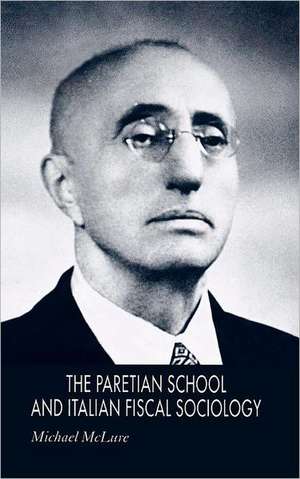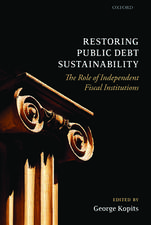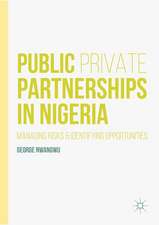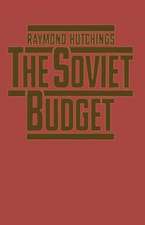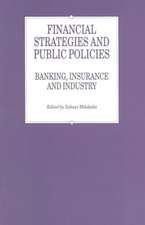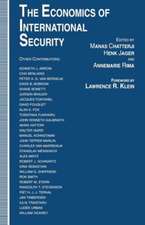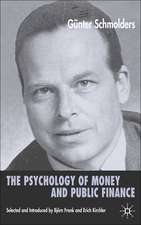The Paretian School and Italian Fiscal Sociology
Autor M. McLureen Limba Engleză Hardback – 31 ian 2007
Preț: 603.06 lei
Preț vechi: 655.49 lei
-8% Nou
Puncte Express: 905
Preț estimativ în valută:
115.43€ • 125.43$ • 97.03£
115.43€ • 125.43$ • 97.03£
Carte tipărită la comandă
Livrare economică 17-23 aprilie
Preluare comenzi: 021 569.72.76
Specificații
ISBN-13: 9781403999535
ISBN-10: 1403999538
Pagini: 363
Ilustrații: XV, 363 p.
Dimensiuni: 152 x 229 x 26 mm
Greutate: 0.7 kg
Ediția:2007
Editura: Palgrave Macmillan UK
Colecția Palgrave Macmillan
Locul publicării:London, United Kingdom
ISBN-10: 1403999538
Pagini: 363
Ilustrații: XV, 363 p.
Dimensiuni: 152 x 229 x 26 mm
Greutate: 0.7 kg
Ediția:2007
Editura: Palgrave Macmillan UK
Colecția Palgrave Macmillan
Locul publicării:London, United Kingdom
Cuprins
PART I: A MONOGRAPH ON PARETO'S SCHOOL AND ITS FISCAL THOUGHT Introduction Criteria for Assessing the Paretian Episode Core Scientific Thought in Pareto's Major Works The Giornale degli Economisti and Paretian Thought Experimental Economics and the History of Economics The 'Paretiani' and their Critics Fiscal Politics and Fiscal Sociology: Murray, Griziotti and Sensini Fiscal Redistribution and Growth: Gino Borgatta Fiscal Decentralisation: An Epilogue to Paretian Fiscal Thought Final Reflections on an Episode in Italian Thought PART II: ARTICLES FROM THE GIORNALE DEGLI ECONOMISTI 'The Science of Public Finance, Fiscal Law and the Notion of State', by Robert A. Murray, 1915 Experimental Economics, by Vilfredo Pareto, 1918 The Scientific Study of Fiscal Phenomena, by Gino Borgatta, 1920 Outline of Theoretical Public Finance, by Guido Sensini, 1929 At the School of Vilfredo Pareto and Maffeo Pantaleoni, by Benvenuto Griziotti, 1949 Pareto's Contributions to the Science of Public Finance, by Mauro Fasiani, 1949
Recenzii
'Pareto optimality is a household word in economics. Pareto's law on income distribution is a staple item in economics and often ignored by those in charge of economic policy. The Italian school Pareto had as a following in public finance and fiscal sociology has not been well documented before. The author does not only describe Pareto's influence on fiscal economic thought in the Italy of his time. Next to the 10 chapters devoted to this task, he provides 6 more chapters which are, essentially, translations from the Italian documenting the kind of fiscal theorising that Pareto instigated. Particularly fascinating in the light of modern developments are his thoughts on experimental economics.' - Prof.Dr.Dr.H.C.Juergen Backhaus Lic.jur., Krupp Foundation Chair in Public Finance and Fiscal Sociology, Faculty of Economics, Law, and the Social Sciences, University of Erfurt, Germany
"Japanese readers must have known of the development of Paretian sociological public finance by Sumio Hyugaji's The Development and the Structure of Public Finance in Italy (in Japanese, 1987). The merit of this volume in comparison to Hyugaji's book is to put forward the criteria established for defining a school of thought .The author's clear account of the SRP [social research program] is valuable because that account provides a criterion by which to distinguish between what merits historical research and what does not.' - The History of Economic Thought
'In the concluding chapter 10, of part 1, the author's definitive statement appears: 'In terms of the criteria established for this study, it is legitimate to refer to the Paretian episode in Italian intellectual history as a 'school of thought'' (p. 172). Given the author's carefully worded statement, his conclusion cannot be challenged within that specific context and on logical grounds. In this sense, the book is an exhaustive study of the Paretian school as represented by Italian fiscal sociology, diligently researched and carefully crafted." - History of Political Economy
'The Italian school and Pareto had a following in public finance and fiscal sociology that has not been well documented before. The author not only describes Pareto's influence on fiscal economic thought in the Italy of his time. Next to the 10 chapters devoted to this task, he provides six more chapters which are, essentially, translations from the Italian documenting the kind of fiscal theorising that Pareto instigated.' - Public Choice
'All in all, the book ably highlights the author's profound interest in Pareto's intellectual legacy in Italy and fills a substantial gap in the literature, presenting in a clear way contributions of considerable historical significance as yet unknown outside Italy. Overall, this is a book that is well worth reading, and extremely useful to all those with an interest in Italian economic thought.' - History of Economics Review
"Japanese readers must have known of the development of Paretian sociological public finance by Sumio Hyugaji's The Development and the Structure of Public Finance in Italy (in Japanese, 1987). The merit of this volume in comparison to Hyugaji's book is to put forward the criteria established for defining a school of thought .The author's clear account of the SRP [social research program] is valuable because that account provides a criterion by which to distinguish between what merits historical research and what does not.' - The History of Economic Thought
'In the concluding chapter 10, of part 1, the author's definitive statement appears: 'In terms of the criteria established for this study, it is legitimate to refer to the Paretian episode in Italian intellectual history as a 'school of thought'' (p. 172). Given the author's carefully worded statement, his conclusion cannot be challenged within that specific context and on logical grounds. In this sense, the book is an exhaustive study of the Paretian school as represented by Italian fiscal sociology, diligently researched and carefully crafted." - History of Political Economy
'The Italian school and Pareto had a following in public finance and fiscal sociology that has not been well documented before. The author not only describes Pareto's influence on fiscal economic thought in the Italy of his time. Next to the 10 chapters devoted to this task, he provides six more chapters which are, essentially, translations from the Italian documenting the kind of fiscal theorising that Pareto instigated.' - Public Choice
'All in all, the book ably highlights the author's profound interest in Pareto's intellectual legacy in Italy and fills a substantial gap in the literature, presenting in a clear way contributions of considerable historical significance as yet unknown outside Italy. Overall, this is a book that is well worth reading, and extremely useful to all those with an interest in Italian economic thought.' - History of Economics Review
Notă biografică
MICHAEL MCLURE is Professor of Economics at the University of Western Australia, Australia. His primary area of research specialisation concerns the contribution of Pareto and his followers. He is the author of Pareto, Economics and Society and was recently appointed co-editor of History of Economics Review, the journal of the History of Economic Thought Society of Australia.
